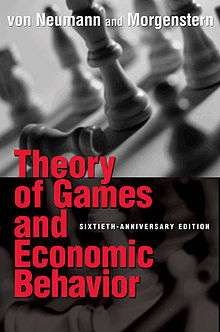Theory of Games and Economic Behavior
 60th anniversary edition, 2004 | |
| Author | John von Neumann, Oskar Morgenstern |
|---|---|
| Country | United States |
| Language | English |
| Subject | Game theory |
| Genre | Non-fiction |
| Publisher | Princeton University Press |
Publication date | 1944 |
| Media type | Print, e-book |
| Pages | xviii, 625 p. (1st edition) |
| ISBN | 978-0691130613 (60th anniversary edition) |
| OCLC | 1629708 |
Theory of Games and Economic Behavior, published in 1944[1] by Princeton University Press, is a book by mathematician John von Neumann and economist Oskar Morgenstern which is considered the groundbreaking text that created the interdisciplinary research field of game theory.[2] In the introduction of its 60th anniversary commemorative edition from the Princeton University Press, the book is described as "the classic work upon which modern-day game theory is based."
Overview
The book is based on earlier research by Neumann, published in 1928 under the German title "Zur Theorie der Gesellschaftsspiele" ("On the Theory of Parlor Games").[3]
The derivation of expected utility from its axioms appeared in an appendix to the Second Edition (1947). Von Neumann and Morgenstern used objective probabilities, supposing that all the agents had the same probability distribution, as a convenience. However, Neumann and Morgenstern mentioned that a theory of subjective probability could be provided, and this task was completed by Jimmie Savage in 1954 [4] and Johann Pfanzagl in 1967.[5] Savage extended von Neumann and Morgenstern's axioms of rational preferences to endogenize probability and make it subjective. He then used Bayes' theorem to update these subject probabilities in light of new information, thus linking rational choice and inference.
References
- ↑ Copeland, A. H. (1945). "Review: Theory of Games and Economic Behavior by John von Neumann and Oskar Morgenstern" (PDF). Bull. Amer. Math. Soc. 51 (07): 498–504. doi:10.1090/s0002-9904-1945-08391-8.
- ↑ Mirowski, Philip (1992). "What Were von Neumann and Morgenstern Trying to Accomplish?". In Weintraub, E. Roy. Toward a History of Game Theory. Durham: Duke University Press. pp. 113–147. ISBN 0-8223-1253-0.
- ↑ von Neumann, John (1928). "Zur Theorie der Gesellschaftsspiele". Mathematische Annalen. 100: 295–300.
- ↑ Savage, Leondard J. (1954). The Foundations of Statistics. New York: Dover.
- ↑ An axiomatization for subjective expected utility appeared in Pfanzagl (1967, 1968) and was endorsed by Morgenstern (1976): "Von Neumann and I have anticipated" the question whether probabilities "might, perhaps more typically, be subjective and have stated specifically that in the latter case axioms could be found from which could derive the desired numerical utility together with a number for the probabilities (c.f. p. 19 of The Theory of Games and Economic Behavior). We did not carry this out; it was demonstrated by Pfanzagl . . . with all the necessary rigor" (page 65).
- Pfanzagl, J (1967). "Subjective Probability Derived from the Morgenstern-von Neumann Utility Theory". In Martin Shubik. Essays in Mathematical Economics In Honor of Oskar Morgenstern. Princeton University Press. pp. 237–251.
- Pfanzagl, J. in cooperation with V. Baumann and H. Huber (1968). "Events, Utility and Subjective Probability". Theory of Measurement. Wiley. pp. 195–220.
- Morgenstern, Oskar (1976). "Some Reflections on Utility". In Andrew Schotter. Selected Economic Writings of Oskar Morgenstern. New York University Press. pp. 65–70.
- Oskar Morgenstern (1976). "The Collaboration Between Oskar Morgenstern and John von Neumann on the Theory of Games," Journal of Economic Literature, 14(3), p p. 805- 816.
- Commemorative edition of the book Theory of Games and Economic Behavior
- A. H. Copeland: (1945). "Review of 'The Theory of Games and Economic Behavior", Bulletin of the American Mathematical Society 51, pp. 498–504.
- Leonid Hurwicz (1945). "The Theory of Economic Behavior", American Economic Review 35, p p. 909- 925.
- Carl Kaysen (1946–47). "A Revolution in Economic Theory?" Review of Economic Studies 14(1), pp. 1–15.
- Jacob Marschak (1946). "Neumann's and Morgenstern's New Approach to Static Economics", Journal of Political Economy 54, pp. 97–115.
- Richard Stone (1948). "The Theory of Games", Economic Journal 58, p p. 185– 201.
External links
- Theory of Games and Economic Behavior, full text at archive.org (public domain)